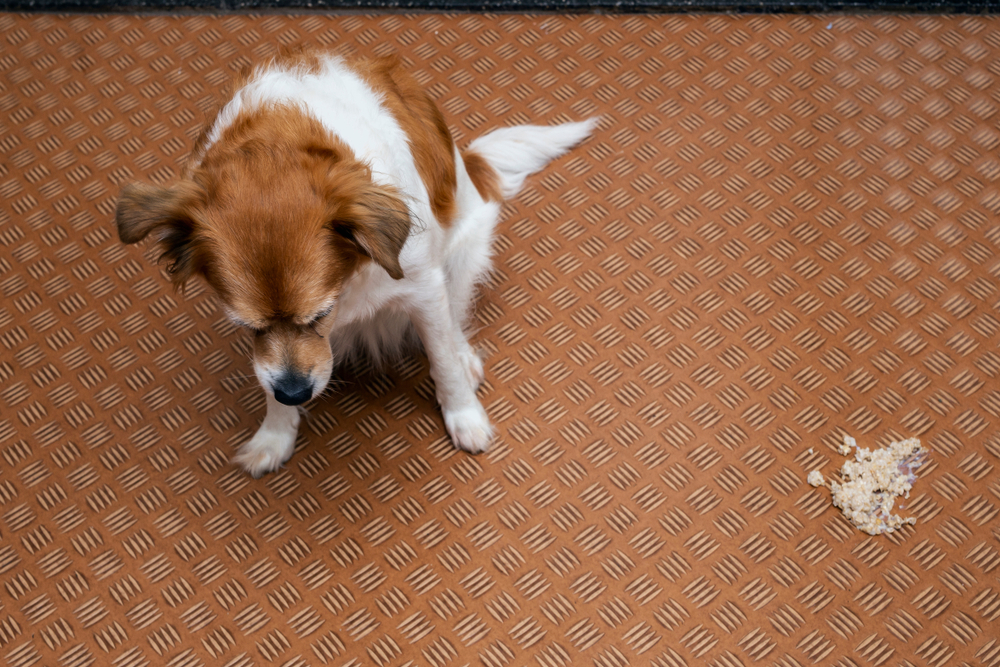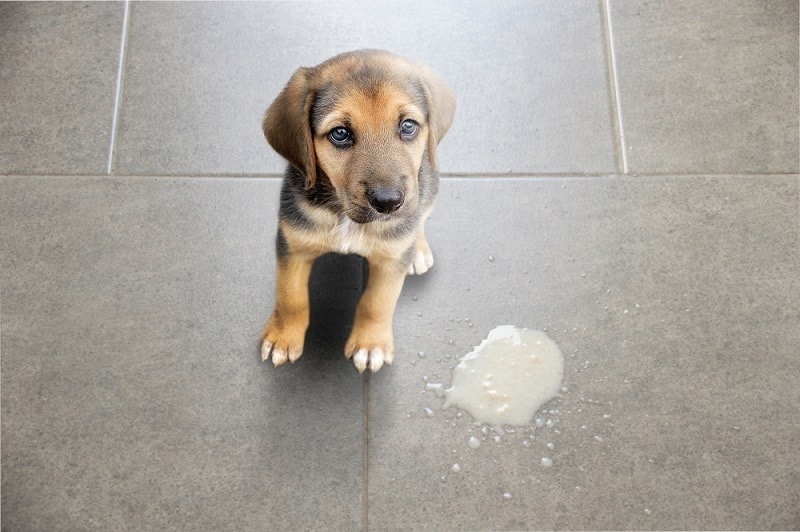Seeing your dog throw up is concerning, and after you’ve had the unpleasant experience of cleaning up after your pet, what do you do now? The first thing to do is make sure that your dog is alright. While many causes of vomiting are nothing to worry about, some can be life-threatening.
The treatment will depend on the reason your dog vomited. That’s why knowing the cause of your dog’s vomiting is crucial. In this article, we’ll talk about why dogs vomit and explain how to care for them afterward. More importantly, we’ll discuss how to tell if vomiting is a sign of an emergency.

What Is Vomiting?
Vomiting is pretty simple, right? It’s often thought that if something comes back up, your dog is vomiting. Well, not always. Sometimes, when something comes up, it’s regurgitation. While these terms are often used interchangeably, they are actually different.
Vomiting occurs when food is forcefully ejected from the stomach and upper intestines. Vomit smells sour and contains bile and partially digested food. Regurgitation is when food comes back up from the esophagus, meaning digestion hasn’t started yet. Unlike vomiting, regurgitation won’t cause heaving of your dog’s stomach because the food isn’t traveling up from the abdomen.
Understanding the difference between vomiting and regurgitation can help you to understand why it happened. For example, dogs may regurgitate due to eating too quickly, whereas vomiting can be a sign of other, more worrying medical conditions.

Signs of Vomiting
It’s usually simple to tell if your dog has vomited, but if you pay close attention to your dog, some signs may appear before they vomit. While catching these signs may not help you prevent your dog from vomiting, they may allow you to take them outdoors before their dinner comes up and lands all over your carpet.
- Excessive drooling
- Licking their lips
- Retching
- Contractions of the abdomen
Causes of Vomiting
There are many reasons why your dog may have vomited. It could be as simple as eating too much or too fast or as dangerous as consuming something toxic. But how can you determine the reason? One of the best ways to narrow down why your dog has vomited is to determine whether or not it is an isolated case or a repeatable instance.
- Change of diet
- Intolerance to something they ate
- Consumption of a toxic substance
- Foreign object stuck in gastrointestinal tract
- Constipation
- Medications
- Intestinal inflammation
There are also medical conditions that may cause your dog to vomit, such as:
- Bacterial or viral infections
- Intestinal parasites
- Acute kidney or liver failure
- Pancreatitis
- Heatstroke
- Bloat
- Cancer
If your dog throws up frequently, there may be a serious medical condition causing it.
- Dehydration
- Diarrhea
- Fever
- Depression
- Abdominal discomfort and/or pain
- Weakness or lethargy
- Blood in vomit
- Significant weight loss
Upon noticing any of these signs, reach out to your vet right away. These indicate that your dog may have a medical issue, and their condition may progress without treatment.
PangoVet. It’s an online service where you can <b>talk to a vet online</b> and get the personalized advice you need for your pet — all at an affordable price!
</p>
<div class="su-button-center"><a href=https://www.dogster.com/dog-health-care/"https://pangovet.com/?utm_source=dogster&utm_medium=article&utm_campaign=dog_vomiting%22 class="su-button su-button-style-default" style="color:#FFFFFF;background-color:#FF6600;border-color:#cc5200;border-radius:9px;-moz-border-radius:9px;-webkit-border-radius:9px" target="_blank" rel="nofollow"><span style="color:#FFFFFF;padding:0px 24px;font-size:18px;line-height:36px;border-color:#ff944d;border-radius:9px;-moz-border-radius:9px;-webkit-border-radius:9px;text-shadow:none;-moz-text-shadow:none;-webkit-text-shadow:none"> Click to Speak With a Vet</span></a></div></div></div>"}" data-sheets-userformat="{"2":513,"3":{"1":0},"12":0}"> If you need to speak with a vet but can’t get to one, head over to PangoVet. It’s an online service where you can talk to a vet online and get the personalized advice you need for your pet — all at an affordable price!


How Do I Care for a Dog That Is Vomiting?
How you care for a vomiting dog will depend on their state. If your dog vomits once and acts normal, they’re likely fine. Something just didn’t sit right with them. Still, keep an eye on your pet and monitor them for any changes to their condition. Give them water, as vomiting can dehydrate dogs, but ensure they only drink small amounts at a time. Drinking too much water too fast may cause them to vomit again.
If your dog is still acting a little off after vomiting, removing their access to food for a little while may be a good idea. If something is wrong with your dog’s tummy, you don’t want them immediately eating again and adding more fuel to the fire. Keep them away from their food for 12–24 hours so their stomach can recover unless there is a reason that they need to eat frequently. For example, puppies and diabetic dogs should have more frequent access to food.
As long as your dog’s vomiting is only a one-time case, there isn’t any need to run to the vet. Of course, you can always reach out to your vet if you are ever concerned for your dog’s well-being, so don’t hesitate to call your clinic if you are worried.
However, if your dog is vomiting frequently or appears unwell, you should take your dog to the vet right away. Do not attempt to treat your dog with home remedies; they can make matters worse. Since vomiting can be a sign that your dog has ingested something toxic or is experiencing severe conditions like bloat, a prompt response could mean the difference between life and death.
Frequently Asked Questions
Vomiting is a common occurrence in dogs. It can mean absolutely nothing, or it can be a warning sign that your dog is suffering from a severe medical issue. With so many shades of gray surrounding the subject, it is natural to want more answers. In this section, we’ll answer frequently asked questions to help put your mind at ease regarding your dog’s health.
What Is Acute Vomiting?
Acute vomiting is when a dog vomits seemingly out of nowhere without a history of repeated vomiting.
- Poor food or water quality
- Contagious diseases
- Parasites
- Bloat
If your dog experiences acute vomiting, that doesn’t mean you have nothing to worry about. Acute vomiting can be a sign of severe issues with rapid onset, such as bloat. Therefore, it’s essential to monitor your dog to ensure they are not displaying signs of a worsening condition.

What Is Chronic Vomiting?
Chronic vomiting refers to vomiting that occurs continuously over a period of at least seven days. It can be constant or intermittent.
- Food intolerance
- Inflammatory bowel disease (IBD)
- Pancreatitis
- Stress
- Foreign Objects
It can be challenging to figure out how to care for your dog after they vomit, and the best way to determine why they’re suffering from chronic vomiting is to consult your vet and run diagnostic tests.

Conclusion
Cleaning up dog vomit is unpleasant, and you may hope it’s only a one-time event. However, your job as a pet parent isn’t done after the clean-up is finished. Paying attention to your dog’s state after they’ve vomited is crucial, as they may require prompt treatment. If you are concerned about your dog’s well-being, don’t hesitate to call your vet and make an appointment.
See also:
Featured Image Credit: Cunaplus, Shutterstock











